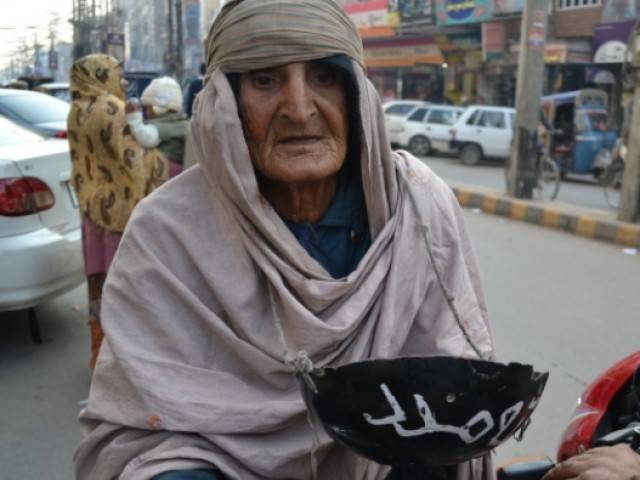The aged citizens of Pakistan are seen at bus stands, railway stations, hospitals, offices, and all public places begging for money for the survival of their family and themselves. The main reason, amidst various other reasons of beggary by senior citizens, is the absence of policy to support them financially. The poor older people desperately need food, health, and shelter; and such issues are to be addressed by the government, humanitarian and development organizations, and other stakeholders.
Elderly people (aged 60-85 years) comprise the largest growing population in the world. Pakistan, with 6.8 per cent population of older people, is the sixth most populous country in the world and it is estimated that this figure will rise to 15.8 per cent by 2050. Amidst other several factors, poverty is the main factor for the poor quality of life for elderly people in the country. Elderly people must be regarded as symbols of esteem, wisdom, and piety and should enjoy high value, respect, and dignity. Although in accordance with cultural norms and moral values existing in our society, they are supposed to be treated with respect, care, and love along with basic health and survival facilities in the society, yet they are facing a number of problems including discrimination, health, poverty, and protection of their rights. There is a great majority of people who cannot afford to look after their parents. As a result, the poor elderly people lead a life of misery, sorrow, and dejection. They get involved in the practice of beggary in order to support themselves. In our poverty stricken rural areas, elderly people die due to lack of food and medical facilities.
The Constitution of Pakistan, for promotion of social and economic well being of elderly people, casts an obligation on the state to provide basic necessities of life for those citizens who are permanently or temporarily unable to earn their livelihood on account of infirmity, sickness, or unemployment. But the government has not taken the trouble to implement the related article of the Constitution and take concrete and effective initiative to address this burning issue faced by the older population.
In 2000 and 2001, the government of Pakistan, realizing its responsibility towards the well being, protection, and rehabilitation of elderly people, had celebrated the International Year of Old Persons with the objective to create awareness about their rights in the society. And to frame a concerted National Policy for the welfare of elderly citizens, a high level National Senior Citizens Task Force (NSCTF) was constituted by the then president of Pakistan. The NSCTF was entrusted with the responsibility to carry out analysis regarding ageing, identification of needs, and draft a comprehensive National Policy in line with national and international commitments. Sorry to say that the NSCTF, due to its lack of interest and will, could not perform the responsibilities. Consequently, today, elderly citizens face hardships and undergo harsh treatment, abusive and filthy language, from the people in front of which they spread their hands and ask for money (kherat).
On December 16, 2012 , HelpAging representative Mr Waqas, expressing concern over lack of law for the rights of Senior Citizens in Pakistan, in a workshop titled “Media Sensitization on Senior Citizens” organized by HelpAging International and UNFPA at Peshawar, said that for protection of rights of senior citizens, the government of Pakistan should embark upon the process of legislation. He stressed that in Pakistan, many civil society organizations, humanitarian and development organizations are working for the rights of senior citizens but in order to amend or initiate new policies, a joint effort is needed to facilitate our graying generation in a respectable way.
Social worker and professor in Pakistan Studies, Zamir Hussain Seelro expressing his views, said that elderly citizens who beg for money at bus stands, railway stations, hospitals, offices, and other public places to sustain themselves and their family members is actually failure of the state to improve standard of life for the elderly population. Due to abject poverty, elderly people are considered an economic burden on the family. He further said that the social welfare department should be given the responsibility to register all unemployed elderly people and subsequently they are to be provided financial support from the Zakat department, Pakistan Bait-ul-Maal, and BISP. To check beggary by elderly persons, monitoring system is necessary to be established at the district level.
We need to ensure fulfillment of cause of the poor elderly people who wish every day to die to put an end to their misery. If these elderly people are properly looked after and taken care of, they can positively contribute to the growth of Pakistan using their skills, experiences, and capabilities. The government needs to undertake and galvanize efforts that ensure a better and safer elderly population throughout the country.
Although poor senior citizens’ rights are human rights and we must protect their rights, yet rights of poor elderly people are ignored resulting in poor quality of life due to heightening number of challenges faced by them in their daily life. In order to break the vicious circle of poverty, the government, realizing the miseries of poor elderly persons, has to provide basic needs and facilities such as provision of improved health coverage in public sector, launching of effective poverty alleviation schemes, and granting short term and long term relief packages. Bank loans are to be provided to the poor elderly people for small business to make them self-sustainable and self-sufficient.






